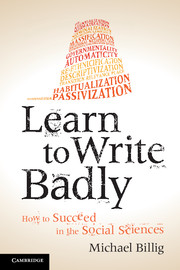Account Episodes
The Management or Escalation of Conflict
£30.99
Part of European Monographs in Social Psychology
- Author: Peter Schönbach
- Date Published: September 2010
- availability: Available
- format: Paperback
- isbn: 9780521155021
£
30.99
Paperback
Looking for an inspection copy?
This title is not currently available on inspection
-
Responsibility and accountability are the issues at the heart of this book. An account episode, according to Professor Schönbach's conception, is a four-phase interaction between an actor and an opponent. Account episodes occur in many different social settings; they are societal means for the resolution or diminution of conflicts engendered by failure events. Frequently, however, such episodes do not accomplish this goal but promote an escalation of the original conflict. The basic questions addressed in this book are under what circumstances an account episode is likely to be successful, and under which other conditions it is likely to founder. Ten studies of interchanges between actor and opponent, based on Schönbach's escalation theory, reveal fascinating interactions between actor and opponent, between severity of reproach, defensiveness of accounts, needs for control of the participants and their gender in determining the course of account episodes.
Customer reviews
Not yet reviewed
Be the first to review
Review was not posted due to profanity
×Product details
- Date Published: September 2010
- format: Paperback
- isbn: 9780521155021
- length: 236 pages
- dimensions: 229 x 152 x 13 mm
- weight: 0.35kg
- availability: Available
Table of Contents
Acknowledgements
Part I. The Task:
1. Demands for accountability
2. The structure of account episodes
3. Functions of account episodes
4. Basic questions and some specifications
5. Fundamental obstacle, multiple approximations
Part II. Theoretical Guidance:
1. Basic control-theoretical assumptions
2. A network of escalation
3. Supplementary speculations
Part III. Study Designs and Procedures:
1. Common design features
2. Vignettes of failure events
3. Reproach phase studies
4. Account phase studies
5. Evaluation phase studies
6. Studies on the meaning of responsibility
Part IV. Category Systems and Codings:
1. Reasons, problems and strategies of category constructions
2. A taxonomy for reactions of actors during account phases
3. A taxonomy for reactions of opponents during phases of reproach and evaluation
Part V. Reproach Phase Results:
1. Effects of severity of failure of reproach
2. Effects of gender on severity of reproach
3. The meaning of responsibility for men and women - and excursus
4. Control needs and severity of reproach
Part VI. Account Phase Results:
1. Effects of reproach on defensiveness of accounts
2. Effects of gender on defensiveness of accounts
3. Sense of control, self-esteem and defensiveness of accounts
4. Severity of failure and defensiveness of accounts
Part VII. Evaluation Phase Results:
1. Defensiveness of accounts and negativity of evaluation
2. Effects of gender on negativity of evaluation
2. Effects of gender on negativity and evaluation
3. Sense of control, self-esteem and negativity of evaluation
4. Severity of reproach and negativity of evaluation
Part VIII. Inferences:
1. Synopsis
2. Transphase perspectives
3. Tasks for the future
Appendices
notes
References
Name index
Subject index.
Sorry, this resource is locked
Please register or sign in to request access. If you are having problems accessing these resources please email [email protected]
Register Sign in» Proceed
You are now leaving the Cambridge University Press website. Your eBook purchase and download will be completed by our partner www.ebooks.com. Please see the permission section of the www.ebooks.com catalogue page for details of the print & copy limits on our eBooks.
Continue ×Are you sure you want to delete your account?
This cannot be undone.
Thank you for your feedback which will help us improve our service.
If you requested a response, we will make sure to get back to you shortly.
×
















